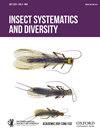Phylogeny and systematics of the “Pronophila clade,” with 2 new genera to resolve the formerly polyphyletic genus Pseudomaniola (Lepidoptera: Nymphalidae: Satyrinae)
IF 3.1
1区 农林科学
Q1 ENTOMOLOGY
引用次数: 0
Abstract
Abstract Analysis of a target enrichment molecular dataset confirms the monophyly of the Neotropical montane butterfly group known as the Pronophila Westwood clade, 1 of 2 major lineages of the satyrine subtribe Pronophilina. The Pronophila clade comprises 18–20 recognized genera and some 125 species. Within this group, the genus Pseudomaniola Röber appears as paraphyletic, and is split here into 3 genera, Pseudomaniola sensu novum with 6 species, including 4 previously considered as subspecies of P. phaselis (Hewitson), the monobasic Fahraeusia Pyrcz n. gen. for Catargynnis asuba Thieme, n. comb., and Boyeriana Pyrcz, Espeland & Willmott n. gen., with 9 species. The adults of all 3 genera can be recognized by their wing color patterns, but the strongest synapomorphies are found in the genitalia, especially those of the male, supporting the above systematic decisions. Notable differences are also found in scale organization and morphology. A divergence time analysis suggests that Fahraeusia diverged from Pseudomaniola + Boyeriana in the mid-Miocene, around 12 Mya, and the subsequent separation of the last 2 genera occurred at the start of the Pliocene at around 5 Mya.“原蝇枝”的系统发育和系统分类学,包括2个新属以解决原多系属的伪蝇属(鳞翅目:蛱蝶科:蛱蝶科)
摘要对目标富集分子数据集的分析证实了新热带山地蝴蝶类群proophila Westwood分支的单一性,该分支是satyrine亚部落proophilina的2个主要谱系之一。原蝇分支包括18-20个公认的属和大约125种。在这一类群中,假omaniola Röber属以副葡萄球菌的形式出现,在这里分为3属,假omaniola sensu novum有6种,包括4个以前被认为是P. phaselis (Hewitson)的亚种,单基faraeusia Pyrcz n. gen为Catargynnis asuba Thieme, n. comb。波耶里亚娜·派尔茨,西班牙;Willmott n. gen.,有9种。3属成虫均可通过翅膀的颜色模式来识别,但突触性最强的是生殖器,尤其是雄性的生殖器,这支持了上述系统决策。在鳞片组织和形态上也存在显著差异。分化时间分析表明,faraeusia与Pseudomaniola + Boyeriana的分化发生在中新世中期,约12亿年前,最后2个属的分离发生在上新世初期,约5亿年前。
本文章由计算机程序翻译,如有差异,请以英文原文为准。
求助全文
约1分钟内获得全文
求助全文

 求助内容:
求助内容: 应助结果提醒方式:
应助结果提醒方式:


